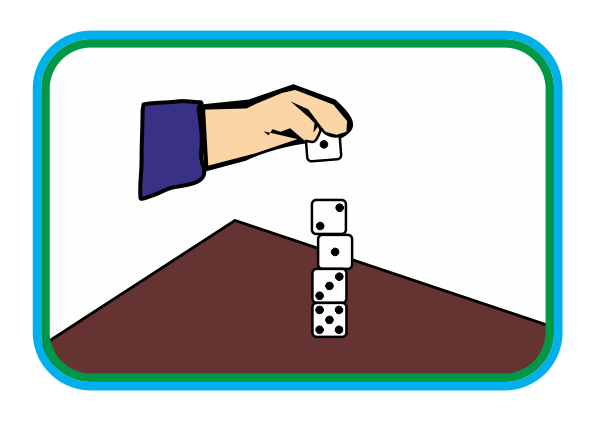
A nation that continues year after year to spend more money on military defense than on programs of social uplift is approaching spiritual death.
Martin Luther King (1957-1968)
Beyond Vietnam - A Time to Break Silence, 1967
Dice Stack

addition
balance
care
speed
Procedure:
Before starting I usually review a few numbers by writing a few at random on a white board. The game is simple. Players take turns rolling a dice and stacking them. Before placing one dice on top of the stack the value of the dice is added to the total. I get the players (or individual dice roller) to say the whole sum, for example:
- Player A rolls a 3: "0 + 3 is 3"
- Player B rolls a 6: "3 + 6 is 9"
- Player C rolls a 1: "9 + 1 is 10"
If the stack falls over players begin again from 0. What's the highest total they can make in 3 minutes?
Variations:
Multiply: For older players give them a multiplier. Write a number on the board and players use it to multiply the dice throw before adding it to the total. Simple multipliers are, of course, 10, 100, 1000. But any number within reason can be used. One interesting way of using simple multipliers is to change the units every time a threshold is reached. For example, start with single digits, then when the score is over 10 switch to 10's, then when the score reaches 100, switch to 1000's. When doing this I write the current sum but not the result on the board.
Count down: Start with a number on the board (the value depends upon the units being used), players subtract from that number. Can they reach zero before the stack falls over?
Note:
The usual way of saying a sum is to say equals. I do use equals with some groups but prefer is as a way of drawing attention to the verb be.
- Top Page
- Splog!
- Articles
- Games
- Across The Table
- Add One More
- Anaconda
- Be A Monster!
- Black Hole (board game)
- Bombs Away!
- Catch!
- Catch-Caught-Caught!
- Centipede
- Charades
- Co-operative Quiz
- Crocodile
- Dice Stack
- Fast Food Tag
- Find My Number
- Find The Penny
- Football
- The Happy Game
- Line Up!
- Maze Challenge
- Natty Narration
- Nose Nose Nose
- One Step Forward!
- Pair Fluency Match 7 - Death Wish
- Pair Fluency Match 7 - Go Green!
- Parrot Parade
- Passport Control
- Reach The Top!
- Snake
- SockIt!
- Tickle Time
- What Cards
- Which One?
- Whose Shoe?
- World Cup Football 2018
- You, You, Me!
- Wake Up
- Packs
- Sheets
- Songs and Music
- Strips (songs and otherwise)
- Stories
- Techniques
- Video
- Environment
- Japan
- The 75th Anniversay of the bombing of Hiroshima
- The 75th Anniversay of the bombing of Nagasaki
- Cars in Japan
- Coronavirus Olympics
- Forest Bathing
- Japan and the Summit
- Japan and World War Two
- Multiculural Japan?
- Olympics Two Tokyos
- Plastic in Japan
- Return to Fukushima
- The Anniversary too Important to Cancel
- Typhoon Jebi
- Yayoi Kusama's Infinity
- Other
- This Week In History
- January, February, March
- April, May, June
- Sub Menu Item
- This Week in History: April 8-10
- This Week in History: April 12-15
- This Week in History: April 19-24
- This Week in History: April 24-26
- This Week in History: May 6-11
- This Week in History: May 11-14
- This Week in History: May 18-23
- This Week in History: May 25-31
- This Week in History: June 1-5
- This Week in History: June 11-14
- This Week in History: June 22-27
- This Week in History: June 15-21
- This Week in History: June 29 - July 5
- July, August, September
- This Week in History: July 6-12
- Sub Menu Item
- This Week in History: July 14-19
- This Week in History: July 27-31
- This Week in History: August 2- 6
- This Week in History: August 17-21
- This Week in History: August 27-30
- This Week in History: August 31 - September 6th
- This Week in History: September 7-13
- This Week in History: September 22-27
- This Week in History: September 14-20
- This Week in History: September 28 - October 4
- October, November, December
- Quizes
- Vocab



